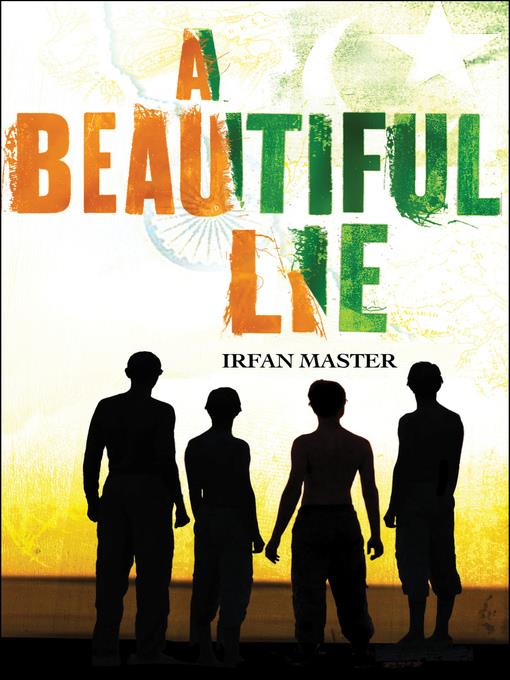
Beautiful Lie
فرمت کتاب
ebook
تاریخ انتشار
2013
Lexile Score
790
Reading Level
3-4
ATOS
5.3
Interest Level
6-12(MG+)
نویسنده
Irfan Masterشابک
9781480449961
کتاب های مرتبط
- اطلاعات
- نقد و بررسی
- دیدگاه کاربران
نقد و بررسی

Starred review from August 20, 2012
In this highly charged and poignant debut novel set in 1947, first published in the U.K., 13-year-old narrator Bilal works hard to conceal the impending partition of India, which resulted in the creation of Pakistan, to protect his dying father and give him peace. Set in a market town in northern India, the narrative leads up to the August 14 division of India along religious lines, separating Muslims, like Bilal's family, from the predominantly Hindu population. Bilal knows this divide will upset his father, a staunch supporter of a united India, and he conspires with his friends to hide the truth from him. Master raises the question of when a lie is warranted, even honorable, and Bilal's decision is further complicated as key members of the town become involved in the deception, and tension and danger mount. The author does not shy from the violence of the period, but balances it with the exceptional kindness shown by Bilal and others. Master's standout novel about loss and love illuminates an intense, fascinating chapter of history, one with bearings on the present. Ages 13âup.

August 1, 2012
It's a done deal--partition will soon divide India into two countries mainly along religious lines, India for Hindus and Sikhs, Pakistan for Muslims--but Bilal's dying father remains serenely confident that his beloved India will take another path and Bilal, 13, can't bear for him to die disillusioned. With three loyal friends--Chota, Saleem and Manjeet--Bilal hatches a plan to convince his widowed father that India will remain whole. Bilal's father is highly respected in their Gujarati town, and his friends refuse to be left out of the loop: doctor, schoolmaster, printer and more; but Rafeeq, Bilal's Muslim-activist older brother, opposes the endeavor. Rising tensions among groups that have mingled peacefully for centuries spill over, shaping the futures of adults and children. Bilal and his friends can't avert the coming violence and losses; their path has been set. More historical and cultural context would have been helpful, but the vivid setting, appealing characters, humor and pathos largely offset this debut's weaknesses. Master declines to shape his tale to fit the triumphalist hero's journey template; his heroes--stubbornly holding onto their ideals and high aspirations, even after they've been superseded by a shabbier reality--are on a different journey, every bit as riveting. A provocative exploration of a historical moment that resonates today. (historical note, maps) (Historical fiction. 11 & up)
COPYRIGHT(2012) Kirkus Reviews, ALL RIGHTS RESERVED.

October 1, 2012
Gr 5-9-It is the summer of 1947 and India is to be partitioned. Tensions are mounting between religious factions and violence is reaching even the smallest villages. Thirteen-year-old Bilal's beloved father is dying, and since he is convinced the news would kill him even more quickly, Bilal decides to lie about the political situation. With the help of his three closest friends, he keeps well-wishers, family friends, even his radical brother at bay, all to "save" his father the grief of knowing the truth. Master's writing is lovely and descriptive. He expertly conveys the poverty of Bilal's village. Readers can smell the mangos in the marketplace, as well as the filth, and taste the dust in their throats. But the tale is not all dark; the author captures the joy of being with friends and family, playing tricks on people, and laughing-all things that people of any socioeconomic status can enjoy and relate to. Since the story is told through Bilal's eyes, readers begin as he does, not completely understanding the reasons for the partition and violence surrounding it. As the tale progresses and readers share his experiences, the situation becomes a bit clearer, though it is never crystalline. The book's pace is slow, perhaps reflecting the pace of life in a poor village. With its unusual historical point of view, this novel is great for thoughtful readers who will give it the consideration it deserves.-Geri Diorio, Ridgefield Library, CT
Copyright 2012 School Library Journal, LLC Used with permission.

October 15, 2012
Grades 6-9 As his father lies dying from cancer, 13-year-old Bilal is afraid that the news of their beloved India's impending partition will hasten his father's death. Bilal vows, with the help of his three best friends, to keep the facts secret from his bapuji. Everybody lies, the boy reasons, but is telling a single lie different from living a lie? As his untruth grows ever more complex and onerous, violence becomes an increasing part of everyday life. Set in 1947, Master's insightful examination of a country at war with itself is made more powerful by young Bilal's point of view. Less realistic is Bilal's attempt to keep the truth from his father; indeed, it requires a willing suspension of disbelief on the part of the reader. However, the setting is so vivid and the boys' friendship so emotionally involving that most readers will overlook any missteps. An engaging debut novel that will also find classroom use.(Reprinted with permission of Booklist, copyright 2012, American Library Association.)

























دیدگاه کاربران